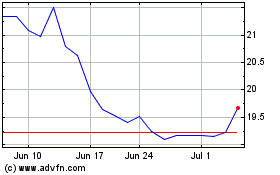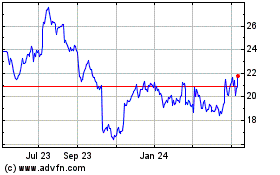Judge Blocks Rule That Would Limit Premium Assistance for Dialysis Patients
January 25 2017 - 9:07PM
Dow Jones News
By Anna Wilde Mathews
A judge blocked a federal rule that was expected to limit
dialysis providers' ability to help patients pay for individual
insurance plans.
U.S. District Judge Amos Mazzant, in Sherman, Texas, issued an
order delaying the rule indefinitely while he hears a suit opposing
it filed by major dialysis providers and a patient group. The
plaintiffs, which included DaVita Inc. and Fresenius Medical Care
North America, a subsidiary of a German company, argued that the
Department of Health and Human Services had improperly rushed out
the rule and that it could hurt patients.
A spokesman for the department declined to comment.
The Trump administration's long-term stance on the rule isn't
yet clear. It will be closely watched by health insurers, which
have objected to the payments that are the focus of the rule. In a
statement, DaVita applauded the judge's order and said it wanted
the new administration to eliminate the rule.
The judge had earlier blocked the rule for two weeks, and
Wednesday he said he would fully grant the dialysis firms' request
for a temporary restraining order. The judge's order said that the
federal agency "did not have good cause to bypass" typical
regulatory procedures when it issued the rule, and "thus, the rule
should be vacated." Also, he wrote that the dialysis providers were
likely to succeed in their case because the rule was "arbitrary and
capricious."
The rule took aim at a setup that has come under fire from
health insurers, particularly those offering plans on the
Affordable Care Act's marketplaces. Under the setup, dialysis
patients get help paying their health-insurance premiums from a
charity, which itself gets funding from dialysis providers.
Dialysis providers are typically paid more for their services when
they treat patients with private insurance, compared with the
reimbursement they get from government programs such as Medicare
and Medicaid.
The rule would require dialysis providers to tell insurers when
their patients are getting help from the providers, directly or
indirectly, to pay premiums for individual insurance plans. The
providers are also supposed to get assurances the insurer will
accept those payments.
Analysts have said insurers would likely often refuse the
payments, with the result that some patients wouldn't be able to
enroll in the individual plans.
Write to Anna Wilde Mathews at anna.mathews@wsj.com
(END) Dow Jones Newswires
January 25, 2017 20:52 ET (01:52 GMT)
Copyright (c) 2017 Dow Jones & Company, Inc.
Fresenius Medical Care (NYSE:FMS)
Historical Stock Chart
From Mar 2024 to Apr 2024

Fresenius Medical Care (NYSE:FMS)
Historical Stock Chart
From Apr 2023 to Apr 2024
